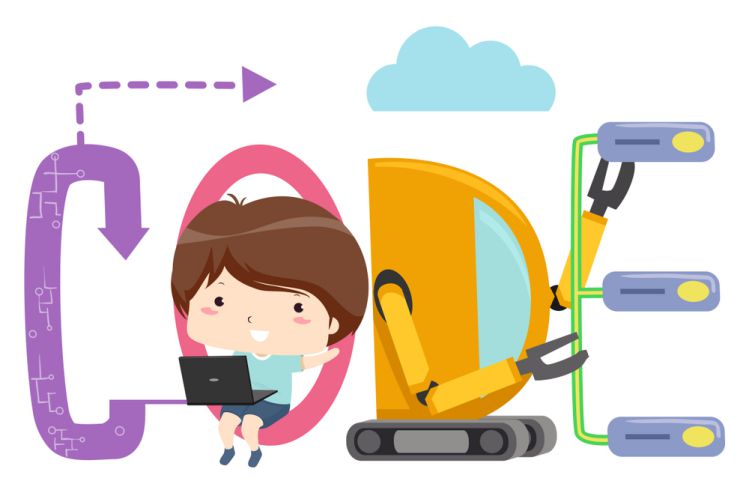In today’s increasingly digital world, programming has become an essential skill for children to learn. So, How to empower kids? Empowering child’s future depends on the right planning and the right choices of parents. However, beyond the technical aspect, coding also offers a unique opportunity to develop vital soft skills such as problem-solving, creativity, critical thinking, and self-confidence.
As a parent, it is essential to provide support and guidance to your child’s coding journey while emphasizing the development of crucial life skills. In this article, we will explore some tips and best practices to help parents become effective advocates for their children’s coding education and personal growth.

Guidelines for Parents: How to empower kids?
Enrolling your child in programming classes can be an effective way to help them develop a growth mindset.
Through these classes, they will learn to break down complex problems into smaller, more manageable tasks, which fosters a systematic approach to finding solutions. This ability to analyze and tackle challenges will serve them well in any field they choose to pursue, as problem-solving skills are universally valuable.
- Foster curiosity and creativity
Encouraging your child’s curiosity and creativity can be done by providing them with various opportunities to explore different coding languages, platforms, and projects. It is essential to support their interests and let them experiment with different coding tools, thereby nurturing their creative problem-solving abilities and innovative thinking. By cultivating a love for exploration and learning, you can help your child develop a growth mindset and the resilience needed to overcome challenges in their coding journey.
- Focus on problem-solving
If your child faces difficulties in their coding projects, it’s essential not to rush to provide them with solutions. Instead, you should encourage them to think critically about the problem, ask questions, and brainstorm possible approaches. This process not only enhances their problem-solving abilities but also boosts their self-confidence as they learn to tackle challenges independently.
- Promote collaboration and communication
Coding is a skill that goes beyond just solving individual problems. It also involves the ability to work with others to develop innovative solutions. Encouraging your child to participate in coding clubs, hackathons, or online forums can provide them with a platform to collaborate with peers, share ideas and projects, and learn from others’ experiences.
This can help your child develop crucial communication and collaboration skills, which are essential for success in any team-based environment. By fostering a sense of community and teamwork, you can help your child build a strong foundation for their future endeavors while also preparing them for the present challenges.
The experience gained by collaborating with others can also help your child gain confidence in their abilities and become more independent problem solvers.
- Encourage reflection and critical thinking
After your child completes a coding project, encourage them to reflect on the process and evaluate the outcome. Discuss what worked well, what could have been improved, and what they learned from the experience. This reflection fosters critical thinking and helps your child grow from their experiences.
- Celebrate achievements and build self-confidence
Help your child set achievable goals for their coding journey and regularly review these goals. Celebrate their accomplishments, both big and small, reinforcing their motivation and sense of achievement. Acknowledging their successes helps build self-confidence and instills a sense of pride in their abilities.
- Be patient and supportive
Learning to code can be challenging, especially for beginners. As a parent, it’s essential to remain patient and supportive, reassuring your child that setbacks and failures are a natural part of the learning process. Encourage them to persevere, problem-solve, and learn from their mistakes, fostering a positive attitude toward coding and learning in general.
- Find a mentor or tutor
If you’re considering introducing your child to the world of coding, it’s essential to understand the role a mentor can play in their journey. Having a knowledgeable and passionate mentor can significantly impact your child’s experience, offering personalized guidance, motivation, and support to help them overcome challenges and develop their skills.
A mentor can provide your child with a safe space to ask questions and make mistakes while learning to code. They can help identify areas where your child may be struggling and offer the necessary resources and tools to help them succeed. Additionally, mentors can provide valuable insight into the industry, share their experiences, and offer advice on how to succeed in the world of coding.
When looking for a mentor or tutor for your child, seek out individuals who have experience working with children and teaching coding. The ideal mentor should be able to communicate effectively, have patience, and be able to provide constructive feedback to help your child improve their coding skills.
It’s also essential to find a mentor who emphasizes the importance of soft skills, such as communication, teamwork, and problem-solving. These skills are vital for anyone looking to succeed in the technology industry and will help your child stand out when applying for jobs in the future.
Overall, finding the right mentor can make a significant impact on your child’s coding journey and set them up for success in the world of technology.

- Stay informed and involved
Parents must stay informed about their child’s coding journey and actively participate in their learning process. Attending parent-teacher conferences, reviewing their projects, and asking about their progress are some of the ways to achieve this. Show genuine interest in their coding education and personal development, and encourage them to remain committed and engaged.
- Encourage a healthy balance
While it’s important to support your child’s coding journey, it’s also essential to encourage a healthy balance between screen time and other activities. Ensure they have ample opportunities for physical exercise, socialization, and leisure activities to maintain a well-rounded lifestyle that nurtures all aspects of their personal growth.
- Be a role model
It’s crucial to display a positive attitude towards learning, problem-solving, and personal growth by incorporating these skills into your own life. By demonstrating to your child that you value continuous learning, flexibility, and the development of soft skills, you set an example for them to follow. If possible, consider enrolling in coding courses or workshops yourself so that you can participate in their experiences and gain a better understanding of the challenges they face.

Conclusion
In conclusion, supporting your child’s coding journey is about more than just providing resources and guidance; it’s about nurturing their personal growth and helping them develop essential soft skills like problem-solving, creativity, critical thinking, and self-confidence. As mentioned earlier about 7, parents need to choose a coach for their children.
In this regard, some children need a private coach, and some can learn programming in a class with other children and their coach. Therefore, it is necessary to first know which coach your child needs. Some programming education academies, such as Codiska’s online classes, provide coding for kids classes under these optimal conditions. By following these tips and best practices, you can become an effective advocate for your child’s coding education and play a significant role in shaping their future success, both academically and personally.






